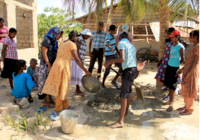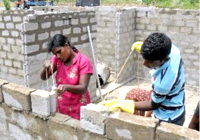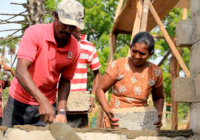20 September, 2013, Northern Province, Sri Lanka
 Mason trainees participate in practical training
Mason trainees participate in practical trainingat a house construction site in Killinochchi district
Women from Sri Lanka's conflict-affected Northern Province are breaking traditional barriers by moving into previously male-dominated occupations in the construction sector. By engaging in vocational skills training programmes in masonry and carpentry, both male and female youth are empowered to pursue skilled occupations. Masonry and carpentry have been traditionally dominated by men with very few women engaged in these sectors.
The young men and women are obtaining these new skills through the Vocational Skills Development of Post War Resettled Communities in Northern Sri Lanka programme. This initiative is organised by UN-Habitat in partnership with the National Apprentice and Industrial Training Authority (NAITA), German Technical Cooperation (GTZ) and CEFE NET Sri Lanka. It follows an innovative approach in training construction workers and gives equal opportunities to men and women. The Programme encourages youth participation with the twin objectives of enhancing their skills and creating a cadre of skilled workers that are urgently needed for post-conflict housing construction activities in the Northern Districts.
The vocational skills development training programme is of six months duration, including three months of class room training and three months of practical training on a construction site. Following three months of intensive classroom training at centres in Killinochchi, Mullaitivu, and Jaffna, the first batch of mason trainees are now undergoing practical on-the-job training at house construction sites. Trainees have been divided into groups and allocated project sites under the guidance of a head mason or trainer.
The curriculum for mason trainees include modules such as basic setting out and excavation of foundations, cement and concrete mixing, construction of foundations, junction and corner construction, plastering and skirting, floor construction, tiling and toilet construction. For carpentry trainees, the training module includes planning and seasoning of timber and planks, manufacturing joints, fixing and adjustments, roof work, shuttering, manufacturing doors, windows and frames as well as varnishing, polishing and spray painting.
 Mason trainee, Sivaneshwary engaged in
Mason trainee, Sivaneshwary engaged inpractical training in Killinochchi District.
Mrs. Mangaleshwaran Sivaneshwary, is a 24 year old masonry trainee from Vishwamadu GN Division in Killinochchi District. Hailing from Talawakelle in Nuwara Eliya district, Sivaneshwary married and moved to Killinochchi in 2011. Although she had previously worked as an Assistant Pre-School Teacher, Sivaneshwary was unable to find suitable work in Killinochchi. This prompted her to pursue an alternate career path and enrol for masonry training. As Sivaneshwary and her husband are currently constructing their home, her training in masonry is already proving useful. "This training programme is very useful, not only because it gives me a job opportunity, but also gives me vital knowledge on masonry work. Now I can monitor the masonry work in our house and ensure the masons follow good construction practices."
Sivaneshwary's instructor mentioned "Sivaneshwary has excelled in both theoretical as well as practical work. She has leadership qualities and is always willing to volunteer her time. She even requests for more practical work to gain experience".
 Mason trainee, Rajani works with her husband
Mason trainee, Rajani works with her husbandat a house construction site in Mullaitivu.
Mrs. Arunagirinathan Rajani is a 34 year old masonry trainee from Odusuddan DS Division in Mullaitivu District. Hailing originally from Jaffna, Rajani has three young daughters. Her husband is a skilled mason who is currently employed constructing houses in the Mullaitivu District. Describing her motivation to join the masonry trade, Rajani states "I have previous experience working with my husband, constructing wells in Jaffna. Due to the conflict, we were both unable to find proper employment. I was very happy when I heard about this training programme from my friends. After discussing with my husband, I decided to train as a mason. Now I work alongside my husband to construct a house in Oddusuddan."
Describing their future plans, Rajani and her husband are hoping to work together at construction sites. "I would like to continue working as a mason with my husband. My earnings will give our family an additional income". Rajani's husband is impressed with her work and her knowledge gained from the training programme.
Some mason trainees are providing construction support to vulnerable beneficiaries who are funded by the Indian Housing Project to construct their conflict damaged homes. This includes constructing foundations, mixing cement and concrete, building house walls and toilets as part of their practical, on-the-job training.
Mason trainee Sivaneshwary mentioned that her group from the Kandawalai training centre are helping a vulnerable, female home owner to construct her toilet as part of their practical training. "We are proud that we were able to use our training and build this toilet. This has given us added confidence and motivation to pursue masonry as an occupation" she said.
 Female carpentry trainees in Weli Oya,
Female carpentry trainees in Weli Oya,Mullaitivu District.
Currently over 280 youth have completed theoretical masonry training while over 110 have completed carpentry training. An overwhelming majority of the trainees are female with 186 women completing the first three months of masonry training and 75 women completing carpentry training. After six months, the trainees will be awarded a Certificate of Achievement for completing competency based training in their chosen occupation of masonry or carpentry by NAITA. Following further training and work experience, they can obtain a valid certificate from NAITA which will enable them to obtain National Vocational Qualification (NVQ) Level 3 certificates.
With the resettlement process under way and large scale development programmes in progress in the North, new employment opportunities are opening up for men and women in the construction sector. The access to training and equal opportunities provided through initiatives such as this programme is enabling young women to train and work alongside their male counterparts.
The Indian Housing Project is a housing reconstruction project funded by the Government of India and implemented through a Memorandum of Understanding with the Government of Sri Lanka. UN-Habitat is one of the Implementing Agencies (IAs) implementing the project in Killinochchi, Mullaitivu and Jaffna. The 36 month project will run until mid-2015 and follows a home owner driven process. During this period, UN-Habitat is expected to support 16,800 families to reconstruct or repair their homes.







